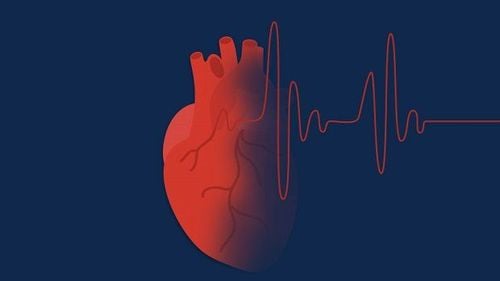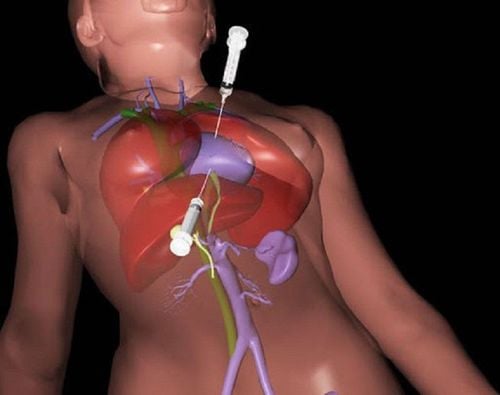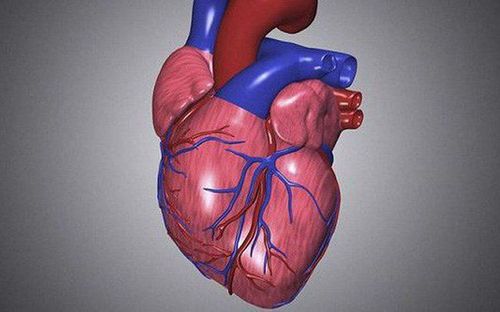This is an automatically translated article.
The article was professionally consulted by BSCK II Nguyen Quoc Viet - Interventional Cardiologist - Department of Medical Examination & Internal Medicine - Vinmec Danang International General Hospital.Normally, the pericardial cavity has only a very thin layer of fluid, which reduces friction and makes the heart easy to contract. If for some reason too much fluid accumulates, it is called a pericardial effusion. This condition is very easy to lead to acute cardiac tamponade, resulting in hemodynamic disturbances, ranging from vascular collapse, mild hypotension to severe cardiogenic shock, and death if not handled promptly.
Know the dangerous complications of pericardial effusion to have a positive management attitude, avoid unfortunate risks that may happen to the patient. Pericardial effusion can cause the following complications:
1. Difficulty breathing
The pericardium has the role of protecting the heart, keeping its shape and reducing friction when the heart contracts. Normally there is always a very thin layer of fluid in this cavity. If there is too much fluid in the pericardial cavity, it will interfere with the work of the heart.One of the first manifestations of pericardial effusion is difficulty breathing. And shortness of breath is also a consequence of decreased myocardial contractility. Shortness of breath will be most evident when the patient exerts himself or does heavy work such as carrying things, walking, climbing stairs... If the epidemic is established quickly and in a large volume, the patient will also have difficulty breathing even when the patient is unable to breathe. lie down.
2. Heart beats fast

When the pericardium is filled with fluid, constricting the volume of the chambers of the heart, the amount of blood that the heart ejects in each stroke is reduced. To compensate, the heart must increase the number of contractions, the heart rate can be up to 120 to 150 times a minute. Heart palpitations will make the patient feel nervous, palpitations continuously in the chest when working as well as at rest, extremely uncomfortable.
3. Low blood pressure
When the heart chambers are pressed by the fluid in the pericardial cavity, the amount of blood ejected will decrease, causing low blood pressure, worse than hypotension.At this time, the patient will suffer complications of low blood pressure, which is lack of blood perfusion to the organs. The most severe is the lack of blood to the brain, making the patient dizzy, dizzy, lightheaded, dizzy. Lack of blood to the kidneys causes kidney failure, little urine. Milder conditions also cause the patient to be pale, cold hands and feet, rapid breathing, fatigue, reduced exercise capacity, and immediate medical attention.
4. Cardiac tamponade and collapse
Cardiac tamponade is the most feared complication of pericardial effusion. This situation occurs when the volume of fluid is established at a rapid rate and in a large amount. The amount of fluid is too large, causing the heart wall to collapse, the volume in the heart chambers is severely reduced. Blood that is not pumped out will quickly lead to heart failure and cardiac arrest, the patient will quickly die.The first aid measure in these situations is pericardiocentesis to decompress. However, if the source of fluid flowing into the pericardial cavity cannot be prevented, such as traumatic pericardial hemothorax or ruptured heart, it is necessary to have a thoracotomy in time to handle it.

5. Cardiovascular examination at Vinmec International General Hospital
Cardiovascular disease is generally a complex specialty, in which invasive interventions on the heart are always advanced and sophisticated techniques. Even for open surgery, the decision needs to be careful and thorough in each operation due to the high risk and difficult postoperative time. Therefore, periodic cardiovascular screening to promptly detect disease, thereby having an appropriate treatment program is extremely necessaryTo help patients determine the cause, complications and level of pericardial effusion , Vinmec International General Hospital currently has a Cardiovascular Screening Package - Cardiovascular Basic Examination, for the following subjects: Cold limbs; heart palpitations; Rapidly breath; Anxiety, insomnia; Shoulder, wrist pain; Unexplained fatigue; Sweating, indigestion; Swollen feet; Frequent migraines; There is a feeling of tightness when walking; Family with heart disease...
Advantages of cardiovascular screening at Vinmec International General Hospital include:
Medical team - doctors are leading experts, highly qualified , dedicated and wholeheartedly for the benefit of the patient, bringing high efficiency in medical treatment; Comprehensive and professional medical examination, consultation and treatment services; System of modern equipment, supporting effective diagnosis and treatment; Modern, civilized, luxurious and sterile medical examination and treatment space. Doctor CKII Nguyen Quoc Viet has more than 20 years of experience in the examination and treatment of cardiovascular diseases and Cardiovascular Interventions (Including imaging, dilation, stenting of coronary arteries, renal arteries...), placing machines temporary, permanent pacing... Before working at the Department of Medical Examination & Internal Medicine, Vinmec Da Nang International General Hospital, the doctor used to work for a long time at Da Nang Hospital.
Please dial HOTLINE for more information or register for an appointment HERE. Download MyVinmec app to make appointments faster and to manage your bookings easily.














